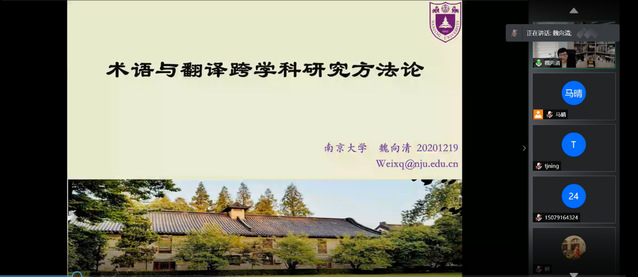
On December 19th, Wei Xiangqing, Professor in English Department in the School of Foreign Studies of Nanjing University, doctoral and post-doctoral Supervisor, Director of MTI Center of Nanjing University and Director of Bilingual Dictionary Research Center, was invited by Professor Miao Ju, Director of Center of Translation Studies in Nankai University to give an online lecture entitled “Interdisciplinary Research Methodology of Terminology and Translation” which more than 120 teachers and students from the College of Foreign Languages attended. This lecture is one of “The Academic Weekend of Post-Graduate Students” Lectures, part of the serial activity, “The Innovation Forum of Graduate Students” held by Department of Graduate Student Affairs of CPC Committee. And it is held in a form of subject report and invites off-campus experts, scholars and outstanding schoolmates at the level of professor from various professional fields as speakers.
In this lecture, Professor Wei Xiangqing introduced various aspects of terminology translation research, including some basic and specific issues, methodology and research methods, Western terminology theory and Chinese terminology practice, etc. At the beginning of the lecture, Professor Wei explained the English and Chinese interpretation of the word research from the perspective of etymology, analyzed the essence of research, and then emphasized that the starting point of academic research (innovation) is to discover and solve problems, and the problem of terminology translation should be taken into great consideration.
Professor Wei first explained the basic and core issues of terminology translation research, that is, the legalization of terminology translation research as a discipline. Then, she discussed the historical uniqueness of Chinese terminology translation practice, including terminology translation and the standardization of Chinese language and writing, terminology translation and the world expression of Chinese knowledge, terminology translation and the construction of Chinese (academic) discourse, as well as terminology translation and the construction of Chinese political discourse and international communication.
Furthermore, she explained the methodology of terminology translation research and specific research methods and issues. On the one hand, she explored the interdisciplinary methods of terminology and translation research from three levels of ontology, epistemology, and axiology, which has provided methodological guidance to terminology translation research. On the other hand, she discussed the theoretical and practical tools of terminology translation research, and elaborated on four specific aspects of Chinese terminology practice combined with the uniqueness of Chinese terminology research, namely the translation and standardization of foreign (new) terminology; terminology excavation and translation of traditional Chinese academic resources; naming and foreign translation of contemporary Chinese original terminology; practical issues of effective foreign translation and introduction of Chinese cultural terms. Combining examples, Professor Wei introduced the uniqueness of Chinese terminology practice, and emphasized the importance and necessity of constructing a Chinese school of terminology translation research.
Finally, Professor Wei Xiangqing pointed out the value and mission of interdisciplinary research on terminology and translation, including solving problems in Chinese terminology practice (standardization), constructing terminology theory with Chinese characteristics (theoreticalization), and participating in international terminology theoretical research (internationalization). At the end of the lecture, she returned to terminology and terminologist, pointed out the etymological meanings of the two terms, and emphasized that the research of Chinese terminology is promising and post-graduate students are the future of terminology research who should be encouraged to do further studies on terminology and translation.
Professor Miao Ju thanked Wei Xiangqing for her lecture and made wonderful comments. She highly praised the lecture's wide scope and detailed explanation, explaining all aspects from three perspectives: terminology, terminology research, and terminology translation research. Professor Miao pointed out that terminology is the core part of language, and we should pay attention to the relationship between terminology and knowledge, thought, conceptual system, and discourse construction. Relative research involves the academic discussion of language planning and language policy, showing how to express and characterize Chinese political thought and theoretical knowledge, traditional Chinese culture, Chinese contemporary culture and international communications, and the construction of a discourse system with Chinese characteristics. Terminology research, terminology translation research, and terminology theory construction research will have an important impact on the future academic development. Professor Miao hopes that post-graduate students will be inspired and educated through the lecture, concentrate on studies, and gain some discoveries and creations.
This lecture is highly built, from shallow to deep, interlocking, echoing from end to end with rich content. Professor Wei Xiangqing combined theory and practice to show a panoramic view of terminology translation research. In the Q&A session, everyone actively asked questions and she answered the questions in detail. The students all said that this lecture was a rare academic feast.



